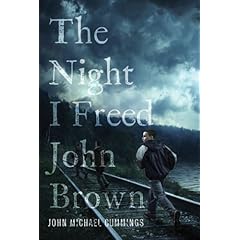My Love-Hate Relationship with John Brown
 I never expected John Brown to dominate the title of my first novel. As a native of Harpers Ferry where he was captured, frankly I was a little sick of him well before I ever became a writer. Yes, he is a standout, albeit white, hero to African-Americans everywhere. Yes, he is a visionary and martyr and all that. But in my hometown, he’s also a commercial icon.
I never expected John Brown to dominate the title of my first novel. As a native of Harpers Ferry where he was captured, frankly I was a little sick of him well before I ever became a writer. Yes, he is a standout, albeit white, hero to African-Americans everywhere. Yes, he is a visionary and martyr and all that. But in my hometown, he’s also a commercial icon. In the case of my novel, Brown’s crusader’s anger became, during the many revisions, a useful foil to my young hero’s pointlessly sour-hearted father. For 13-year-old Josh Connors, faced all his life with the sight of a musket-thrusting wax John Brown statue across the street from his house, Brown is like a crazy uncle who, unlike Josh’s father, does something with his anger—and becomes famous for it! In Josh’s young mind, Brown is a man of action. He doesn’t feel sorry for himself to the point of bringing his life and family to a standstill. He makes things happen. He gives my young character, in his sheltered life, a way of seeing what is wrong with his unhappy father: The man’s mean for no purpose.
It is Josh’s new, more worldly neighbors who, like the tourists, bring a pilgrim’s hero worship to the abolitionist’s feet. To them, it’s a no-brainer. Slavery is totally wrong. Brown gave his life to stop it.
Josh’s father’s racist undertones, by contrast, never made it into this somewhat autobiographical novel. The most he can say to a young adult audience is “it would be a cold day in hell before he’d be jealous of a treason-hearted Calvinist.” The man I know in real life who the character is based on would have much more to say, most not fit to print.
Prejudices I was subjected to at home growing up were inflamed because of this wax John Brown staring at our house. He was in our faces, with his fury. He put us back on our heels for being white. The man’s legacy was fire-raising accusations. He made us all feel not unlike how I feel today when Reverend Al Sharptonpoints his finger at me, just because.
In the making of this novel, Brown sparked this same love-hate relationship literally from the first words on. It was undecided, briefly, whether the title of the novel would be The Night I Freed John Brown or, incredibly, The Night I Shot John Brown. Thrown in were other variations. The Night I Battled John Brown. The Night I Ran With John Brown. For a while, I was running the gamut of verbs with this man. But good marketing sense prevailed.
As the world grapples with a new age of terrorism, I have heard it said that John Brown was the Timothy McVeigh of his time. Luckily, my novel didn’t have to address that one. Rather, it shows how a town’s culture is centered on Brown and how different corners of the village react to him. In the case of my hero, who’s too young and sheltered to wonder if terrorist violence can be justified, Brown is a wild-eyed man who affects everyone around him, either positively or negatively. When Josh’s neighbor, for example, plays the lead in a local play about John Brown, just the sight of this kindly Mr. Richmond transforming himself into an enraged madman, only to fall out of character with a smile, enthralls Josh. All of a sudden, the relentlessly crazy-looking man depicted in wax across from his house, when seen in the make-believe world of acting, is someone more fathomable and admirable. Thanks to Mr. Richmond, John Brown is personified with a human side. Later, during this community play, Josh has the opportunity to play one of John Brown’s sons and to discover this same on/off switch on his own fiery face.
I have come to wonder what Brown would have thought of my use of him as a literary device. Not much probably. Whims of a starry-eyed writer. He and I would not have gotten along, I don’t think. He would have only confirmed what I already know: unyielding anger by one costs everyone a big price. Given his stern ways, Brown, as a father, would have likely been no better for Josh than his own father.
The world continues to ask: saint or madman? Okay, I’ll answer right here. Slavery is barbaric, but murder is murder. So there can be only one answer: both.